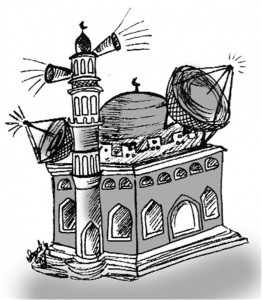
Poll rigging

Sir,
Opposition parties such as the PTI should be talking about issues of public interest instead of confining themselves to the debate over poll rigging. In the recent past, when elected parliaments failed to keep a check on such matters, the superior judiciary took notice in the public interest and came to the country’s rescue. But the emergence of the PTI as an alternative political force – with more public appeal than the PPP – places a heavy responsibility on the shoulders of its leadership. Both the party and its leader Imran Khan need to realize that, more than cultivating the fan-club factor, they need to relate to the basic problems that confront ordinary men and women in Pakistan.
For citizens of Karachi, whose daily lives are marred by inadequate water resources, poor roads, an overburdened public transport system, and street crime and violence, it is irksome to keep hearing nothing but allegations of rigging. Issues like the proposed LNG scheme, if raised by the PTI, would motivate the public more, especially in urban centers where such schemes are likely to cause an escalation in prices.
Imran Khan also needs to assess why his party has bagged fewer seats in Lahore and the Walton Cantonment areas, which are largely middle class-dominated. The crowds that gathered to support the PTI at Lalik Chowk (comprising mostly women and young people) were ready to protest for hours at his call, but remained absent at the polling booths. He needs to understand that it was his poor choice of candidates that has contributed to the party’s dismal performance in the recent local body polls. There was absolutely no door-to-door campaign – something that the party’s women supporters could have carried out in the cantonment and DHA residential areas.
In politics, it is necessary to keep a finger on the pulse and aspirations of the public rather than doggedly pursuing issues that, in one’s own opinion, are more important. The party’s pursuit of rigging issues has already reaped dividends and delving into it any further from public forums might have the reverse effect.
Tariq Malik,
Lahore.
Too loud!

Sir,
The misuse of loudspeakers was recently banned in Pakistan. Although their use has been effectively curtailed in parts of Lahore, Gujranwala, Jhang, Faisalabad, and Sahiwal, no such regulations have been enforced in the smaller towns and neighborhoods, where residents are still subject to this annoyance. In areas such as Faisal Town, Iqbal Town, Samanabad, Shahdara, and the Walled City (Mochi Gate, Rang Mahal, and Bhaati Gate), the misuse of loudspeakers is even wider, with some mosques continuing their broadcasts through the night. This creates ill feeling towards the mosque management and other religious circles.
I would like to request the government to take action on this: the ordinance regulating the use of loudspeakers should be properly applied across the board. In Punjab, the ordinance allows mosques to use only one loudspeaker for the azaan and the Friday sermon. Anyone caught violating this rule should be penalized. Moreover, the rule should be strictly enforced without any discrimination. It is worth noting that this rule was followed only when the ordinance was initially passed. In the weeks that followed, it has been increasingly ignored.
Falak Naz,
Lahore.
Cybercrime bill

Sir,
There is a great hue and cry on the social media regarding the recently approved Prevention of Electronic Crimes Act 2015. Many people have criticized the bill heavily on Facebook while numerous political leaders, rights activists, IT experts, bloggers, and social media strategists on Twitter have rejected the draft law using the popular hashtag #WeRejectCyberBill. Ms Anusha Rahman, Minister of State for Information Technology and Telecommunication, claims that the bill is necessary to prevent unauthorized acts with respect to information systems.
It is very surprising to note that the minister herself has no official Facebook or Twitter profile, even on the ministry’s website. This begs the question, when the minister responsible for this portfolio is evidently not active on social media platforms, how much knowledge can she really have of issues relating to cybercrime. Equally, she is likely to be unaware of trending topics on Twitter – otherwise an easy way to obtain updates on any number of important issues.
It would be valuable for the Government of Pakistan as well as for the Ministry of Information and Technology to take on board the views of various IT experts, bloggers, and social media strategists as far as the cybercrimes bill is concerned. I suggest that the ministry develop online suggestion and comment forms for its website and create a Facebook page.
The other key issue regarding this bill is that it is only available online in English, despite the fact that most Internet users in Pakistan are better versed in Urdu. The National Assembly’s standing committee on information technology must translate the text of the bill into Urdu so that the public has access to its content.
Mubashir Mahmood,
Karachi.
Schools’ security

Sir,
I would like to highlight the state of the security measures currently in place at almost all educational institutions in Pakistan, following the attack on the Army Public School in Peshawar. While security conditions continue to change, the people responsible for implementing these measures – checking entrants at the gates and performing other such duties – have ceased to be as vigilant as they should.
If our children really are under threat, we need to be more heedful. Millions of children go to school everyday. All educational institutions should be more proactive in protecting their students. Parents, too, deserve to have peace of mind when they send their children to school or college. Such institutions should introduce emergency drills and quick-escape procedures in case of an unexpected threat. Millions of lives are at stake. The least we can do is protect ourselves in every way possible.
Arfeen Baig,
Lahore.
Work force
Sir,
Increasing globalization and competitiveness have brought to the forefront the importance of effective human resource management (HRM) for national and international organizations. In recent years, there has been a remarkable development in this field throughout the world, although the challenges of HRM in developing countries remain complex and demanding.
As the world develops into a global village, we need to know how managers cope with HRM issues. Pakistan is the seventh most populous country in the world. At 2.18 percent, it has one of the world’s highest population growth rates such that, in the next decade, its population is expected to surpass 260 million. The total employed labor force is estimated at 38.18 million, which is barely a third of the total population. In effect, 41 percent of the total population is under the age of 14. Meanwhile, slow economic growth over the last two years has left well over 2 million people unemployed.
Over the years, a number of researchers have highlighted the significance of national factors (such as national culture, work-related values and the external environment) in understanding HRM systems. Research has shown that social institutions such as the family and education and socialization processes influence companies’ strategies and organizational practices in a systematic way, with the result that their structures and processes often reflect typical national patterns.
The government needs to launch initiatives to manage the labor force by providing employment opportunities, skills through education, and vocational training programs and incentives to utilize the human resources that Pakistan’s youth population represents.
Moreover, madrassas need to be monitored and their student counts registered from the perspective of utilizing them as a potential workforce. Conventional and technical education should be part of their curriculum to enable these students to contribute positively to the development of the country. Women, who constitute half the population, also play a significant role in the development of the nation. Introducing small-scale industries by providing loans to women workers, for example, is an excellent initiative on the part of the government.
Unless we arm the population with the skills and opportunities they need, we cannot improve the state of the economy.
Amna Malik,
Islamabad.
Security for our teachers
Sir,
Terrorism is the biggest threat to Pakistan’s progress. The recent attack on Karachi University professor Waheed ur Rahman on 29 April 2015 was another horrible example of this. According to the reports, he was killed when four unidentified attackers on motorcycles opened fire on his car. The police surgeon said that Rahman received five bullet wounds to his face, neck, chest, abdomen and arm, while the police reportedly recovered eight bullet casings from the site. The assailants managed to flee the scene soon after the attack. Rahman’s body was taken to the Abbasi Shaheed Hospital in Karachi.
The slain professor was an active member of the faculty. Dr Raffia Taj, former chairperson of the Mass Communications Department, said that his death was a “great loss for the department” and that he had been unfailingly kind. In the wake of Rahman’s death, university activities have been suspended for two days. It is worth remembering that, just last September, Dr Shakil Auj, dean of the Islamic Studies Faculty at the university, was killed in Gulshan-e-Iqbal in Karachi.
I would like to request the government and the authorities to investigate his death and take measures to curb terrorism in our city. Our teachers clearly need better security.
Mehwish Mustafa
Karachi
PM at Gallipoli

Sir,
I fail to understand what benefits Pakistan has reaped from the numerous state-funded visits that our political leaders continue to make to London and Dubai and elsewhere. Compare the frequency of these foreign junkets by elected and paid public office holders with those of leaders in China, India, Iran or even Bangladesh. Then note the economic progress achieved by these countries relative to Pakistan.
The 100-year celebrations marking the Battle of Gallipoli (April 1915 to January 1916), when the Subcontinent was under British occupation, bear no historical or emotional relevance to the people of Pakistan. The battle has significance for Turkey and Britain, which explains their presence, but with only representative attendance by other European and Commonwealth nations.
While KP has been seriously affected by a natural calamity, claiming over 40 lives and hundreds of casualties, our PM continues his four-day visit to the UK, funded by the taxpayers of Pakistan. Our political leaders (most of them billionaires) can easily afford to undertake private visits at their own expense to meet their children in the UK or UAE, instead of burdening the national exchequer.
Has it ever occurred to them why the US President and other leaders of democratic countries consider it obligatory to celebrate Christmas in their own countries? Do they understand the significance of feeding the homeless and orphans on such religious occasions? It seems our leaders prefer to fly out and celebrate with their families abroad instead. Why is there such a disconnect between the rulers and the ruled?
T M Ali,
Lahore.
Energy shortages

Sir,
Unlike the sheikhdoms of the Middle East, Pakistan is a constitutional parliamentary democracy where neither the Prime Minister nor the cabinet have unilateral power. This requires transparency in financial deals with any country in accordance with the rules, and an active built-in system of checks and balances with provision for judicial oversight in case of any abuse of authority.
Pakistan faces financial constraints and energy shortages because the governments that have assumed power thus far – whether elected or otherwise – have signed inappropriate one-sided deals in the power sector, with guaranteed capacity remuneration irrespective of whether this power eventually feeds into the national distribution system. The failure of Parliament and the opposition to ensure the rule of law, rather than that of individual whims, has had an adverse impact on the common citizen and not served the cause of democracy.
The promised injection of investment by Pakistan’s strategic partner China will not help us achieve economic sustainability unless institutionalized corruption and the pilfering of scarce resources by the ruling political elite and paid bureaucracy is curbed with an iron hand. A floating re-gasification storage unit has been hired by a private party to feed gas into the national distribution system. In case of non-utilization for any reason, the Pakistan government will apparently pay demurrage charges in excess of $237,000 per day.
Nobody knows what cost this imported energy will incur for ordinary consumers at a time when petroleum products and gas are facing a recession worldwide. Both SNGPL and SSGPL are already facing losses because of repeated political interference and large-scale theft by influential commercial energy consumers. PSO is bogged down by corruption and incompetence, while OGRA has been reduced to the status of a white elephant. One hopes that the Supreme Court will take notice and order the prosecution of the ministers and bureaucrats concerned for any abuse of power to the detriment of the national exchequer.
Malik Ali,
Lahore.

